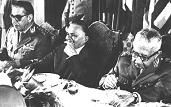#1023
Mensagem
por soultrain » Ter Jul 25, 2006 7:52 pm
2 Senators Fight F-22 Multiyear Plans
By WILLIAM MATTHEWS
Two of the most influential members of the Senate Armed Services Committee set about July 25 to overturn the Senate’s vote for a multi-year purchase of F-22 stealth fighters.
Sens. John Warner, the committee chairman, and John McCain, chairman of the airland subcommittee, said a possible financial conflict-of-interest may invalidate estimates that the Air Force could save money by signing a three-year contract to buy 60 F-22s. They also warned that committing nearly $11 billion to the F-22 could make money unavailable for other aircraft, including the Joint Strike Fighter, C-130J cargo planes and refueling tankers.
Lockheed Martin builds the F-22 and C-130J, and leads the industry team developing the Joint Strike Fighter.
During an airland subcommittee hearing, Warner said conflict-of-interest allegations have tainted the findings of a research institute hired by the Air Force to determine whether a multi-year buy would save money.
The president of the Institute for Defense Analysis, retired Adm. Dennis Blair, owns stock and stock options in a subcontractor on the F-22 project and could benefit financially from a multi-year F-22 buy, according to a report by the Project on Government Oversight, a watchdog organization.
POGO said Blair is on the board of directors of EDO Corporation, an F-22 subcontractor.
“As of July 5, 2006, Blair owned 1,787 shares of stock and 30,000 stock options in the company. As a result, Blair himself stood to financially profit from a favorable multi-year procurement decision for the F-22,” the organization said.
A spokesman at IDA July 25 said the institute and Blair were preparing a response to the report.
Warner called the POGO discovery “extremely serious.” He added, “I really think it taints the validity of this report.”
The Air Force and F-22 maker Lockheed Martin relied heavily on IDA findings to convince senators to support a three-year buy of stealth fighters. The IDA concluded that a three-year deal would save $225 million to $235 million.
Analysts from three congressional agencies disagreed.
David Walker, U.S. comptroller general, said the multi-year buy would add $1.7 billion to the cost of the F-22 program. About $700 million of the extra cost comes from adding four planes – the Air Force had planned to buy 56 over two years rather than 60 over three. Another $1 billion comes from stretching the program by an extra year, Walker said.
Christopher Bolkcom of the Congressional Research Service, told the subcommittee, “I am not certain that the savings estimates are realistic. Many multi-year procurements never generate the savings they promised.”
David Newman of the Congressional Budget Office said the estimated savings are plagued by “the uncertainty inherent in such estimates.”
But Warner and McCain may have a tough time reversing the Senate decision to allow the multi-year F-22 buy. The Senate voted 70 to 28 for the buy in June despite the Armed Services Committee’s opposition.
Warner expressed shock. He said in his 28 years on the committee he had never seen the full Senate overturn a major decision by a subcommittee and full committee.
He attributed the reversal to an intense last-minute lobbying campaign by Lockheed Martin.
Sen. Saxby Chambliss, R-Ga., who pushed an amendment permitting the three-year F-22 buy through the Senate, maintained that multi-year buy will yield at least $225 million in savings.
An aide to Chambliss said the permission for the multi-year buy has been approved in the House as well as the Senate. “The vote is decisive. I don’t see how you back away from it,” he said.
But Warner said the conflict-of-interest allegation is a new fact that must be examined by a House-Senate conference committee.
He said, “One important voice hasn’t spoken yet: the conference chairman” — Warner himself.


.jpg)








